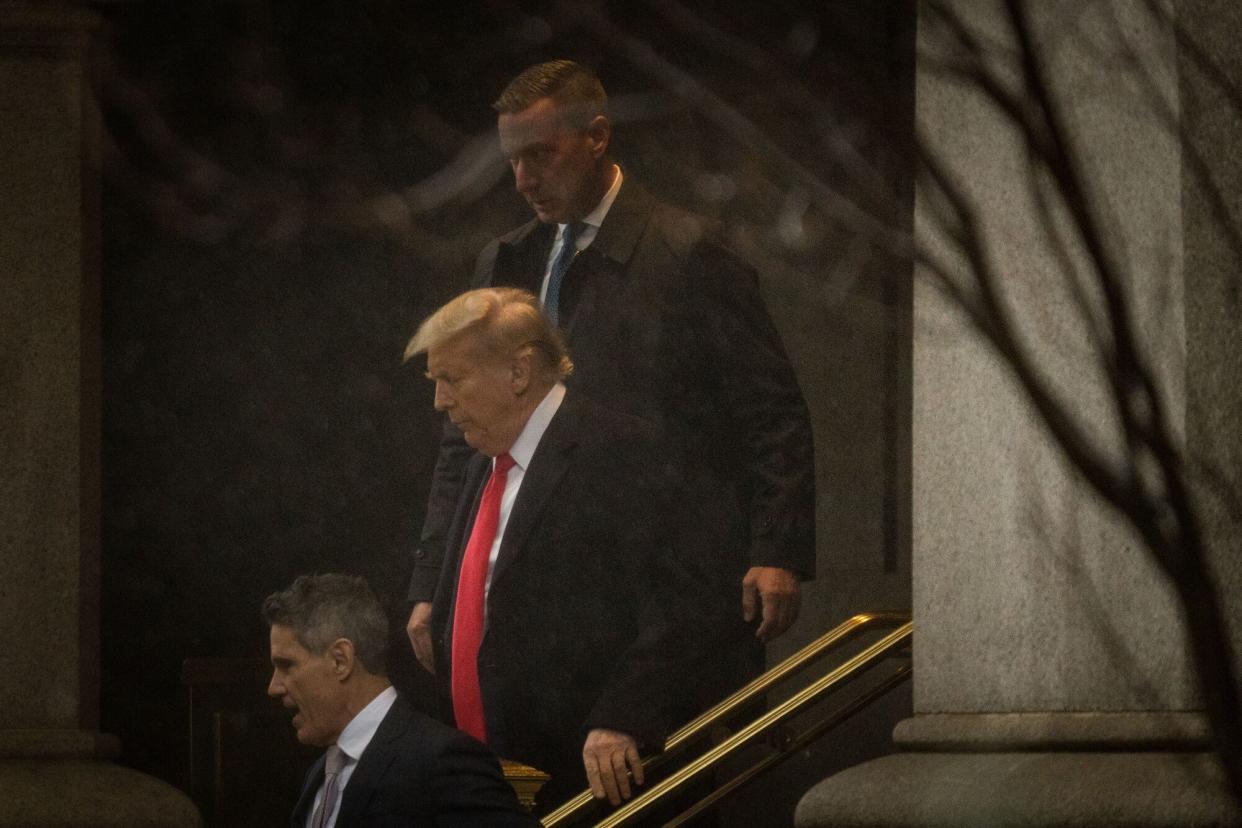Trump’s Jan. 6 Immunity Claim Is Met With Skepticism From Appeals Court

(Bloomberg) -- Donald Trump’s claim that he is immune from prosecution was met with skepticism by a US appeals court panel, suggesting an uphill battle in his effort to avoid a criminal trial over his attempt to overturn the 2020 election in his final days as president.
Most Read from Bloomberg
Bottled Water Contains More Plastic Particles Than Previously Thought
Boeing CEO Fights Back Tears and Admits ‘Our Mistake’ in 737 Address
At a packed hearing in Washington on Tuesday, judges peppered Trump’s lawyer with questions testing how far such a theory could go, with one judge asking if a president could order the killing of a political rival and get away with it because it’s an “official act.”
“Could a president order Seal Team Six to assassinate a political rival?” Judge Florence Pan asked Trump’s lawyer D. John Sauer, referring to the elite US Navy strike force. “That’s an official act, an order to Seal Team Six.”
Sauer said that such a president would “speedily be impeached and convicted” by the US Senate, paving the way for criminal charges. But Sauer repeatedly declined to give a direct answer when Pan, who was nominated by President Joe Biden, asked whether criminal charges could be filed in the absence of an impeachment and conviction.
Trump, accused of conspiring to illegally stay in office after losing the election to Biden, is trying to reverse a Dec. 1 ruling by US District Judge Tanya Chutkan, who rejected Trump’s immunity defense and suggested he was seeking the power of a monarch. It’s one of four criminal cases Trump is facing as the Republican frontrunner for the White House in the November election.
Trump attended the Washington hearing, an indication of how his campaign strategy is intertwined with his court appearances. Wearing a blue suit and signature red tie, Trump was expressionless as he entered the courtroom and appeared to watch the judges and listen carefully during the arguments. At times, he nodded his head in agreement when Sauer spoke.
Constitutional Duty
Sauer argued that presidents can only be criminally charged if they are first convicted by the US Senate in an impeachment trial over the same conduct. Trump was acquitted in his impeachment trial by the Senate over the 2020 election.
The judges repeatedly asked how the impeachment-first rule would be applied to crimes that don’t lead to an impeachment.
“I think it is paradoxical to say his constitutional duty to take care that laws are faithfully executed allows him to violate criminal law,” said another judge, Karen Henderson, who was appointed by former President George H.W. Bush.
Sauer argued that allowing prosecutions without impeachment would have raised the risk of former President George W. Bush being charged for giving false information to Congress leading to the war in Iraq, and Barack Obama being charged for authorizing drone strikes that killed US citizens abroad.
“To authorize the prosecution of a president on official actions would open a Pandora’s box in which this nation would never recover,” Sauer said.
Trump has signaled that he will take his fight to the US Supreme Court if he loses the appeal. The immunity challenge may affect the March 4 trial date and potentially the timing of three other criminal cases facing Trump.
“You can’t have a president without immunity,” Trump told reporters after the hearing. “As president you have to be able to do your job.”
James Pearce, a lawyer working under Special Counsel Jack Smith, told the appellate panel that he doesn’t believe a ruling against Trump would result in unjustified “tit for tat” criminal charges against future presidents.
Political Assassination
Pearce asked “what kind of world are we living in” if a president can order a political assassination and avoid criminal charges by resigning before he can be impeached. He called it an “extraordinarily frightening future.”
After the court hearing, which comes less than a week before the Iowa caucuses, Trump is skipping the GOP debate Wednesday to attend a town hall and then heading to Manhattan for closing arguments in New York state’s $250 million civil fraud trial against him and his real estate company. Smith is seeking to try the case before this November’s presidential election.
The appellate panel could issue a ruling as soon as this week. Whichever side loses could appeal to the full DC Circuit or the US Supreme Court, but neither are required to take up the case and could allow the panel’s ruling to stand.
The panel also included Judge Michelle Childs, another Biden appointee.
Smith has previously argued that presidents don’t have immunity from criminal acts committed while they were in office, citing the pardon given to former President Richard Nixon before he could be indicted over the Watergate scandal. The fact that Nixon was pardoned shows that it’s possible for a president to be charged after he or she leaves office, Smith says.
The Washington hearing comes a day after Trump made an immunity argument in a motion to toss out similar state election-fraud charges in Georgia brought by Fulton County District Attorney Fani Willis. Trump argued in that case that he’s immune from criminal charges over the 2020 election because the US Senate acquitted him at his 2021 impeachment trial over the same conduct.
--With assistance from Skylar Woodhouse, Christian Hall and Jordan Fabian.
Most Read from Bloomberg Businessweek
Tropical Underworld: The Murder Case That Could Topple an Alleged Crime Empire
Private Equity’s Horrible, No-Good ’23 Set to Continue Into ’24
Trumponomics 2.0: What to Expect If Trump Wins the 2024 Election
©2024 Bloomberg L.P.



